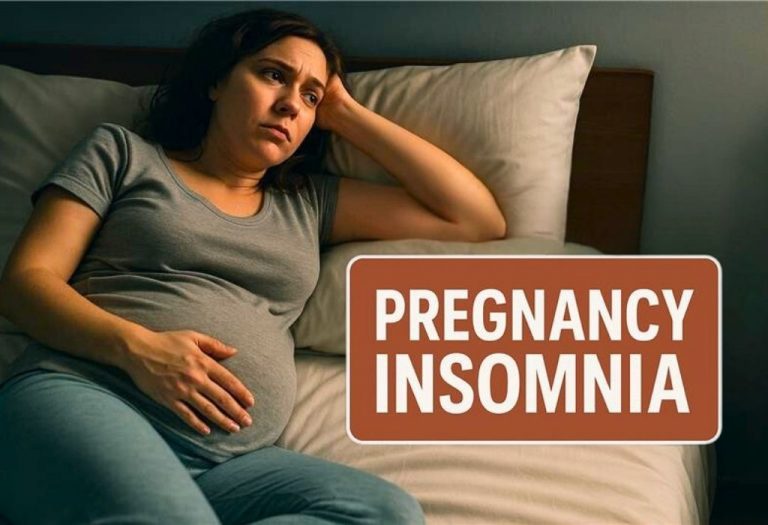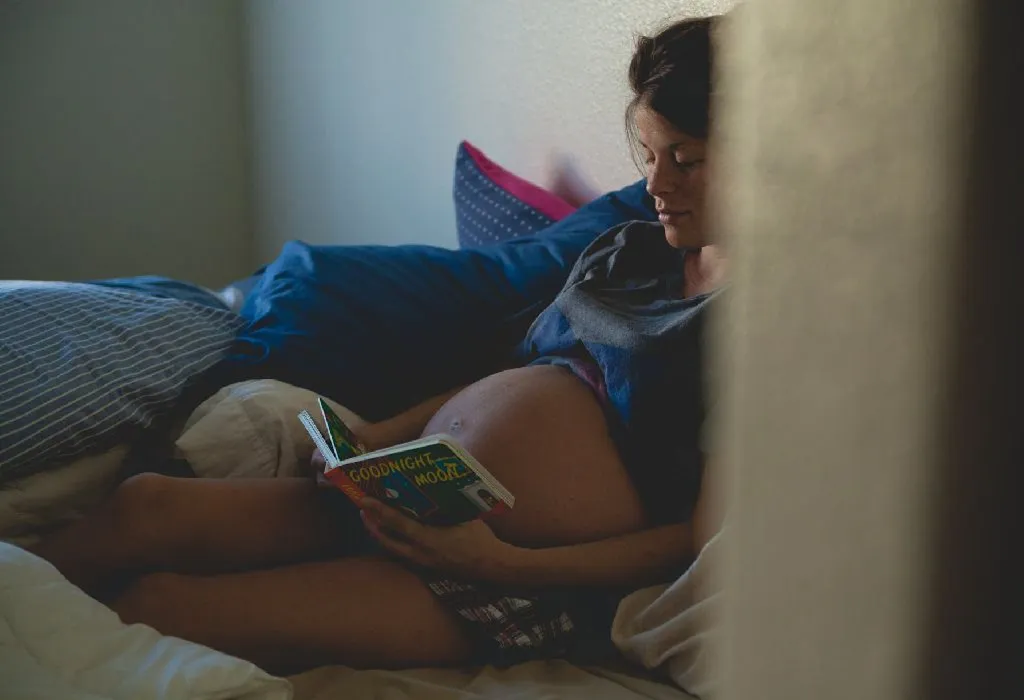Insomnia During Pregnancy – Symptoms, Causes and Treatment
Pregnancy insomnia is a common phenomenon during the third trimester. Cope with it by maintaining a proper sleep and nap routine, doing exercises and avoiding caffeine. Avoid taking any sleeping pills and cut off your alcohol intake to have a sound sleep at night during pregnancy.
A sound and comfortable sleep becomes a rare treat for a pregnant woman as she starts getting leg cramps, feels too tired to sleep, has to wake up frequently to pee, and the heavy abdomen has her tossing and turning to find a comfortable position. This lack of sleep then leads to more tiredness and restlessness during the days and nights that follow. Here are some facts to help you deal with the problem and get a good night’s sleep:
What Is Pregnancy Insomnia?
Pregnancy insomnia is a common sleep disorder characterised by difficulty falling asleep, staying asleep, or experiencing non-restorative sleep during pregnancy, often caused by a combination of physical and hormonal changes. These disruptions can include frequent urination, back pain, heartburn, restless legs syndrome, anxiety, and the challenge of finding a comfortable sleeping position, especially as the pregnancy progresses and the baby grows, leading to significant fatigue and impacting the overall well-being of the expectant mother (1).
Is Insomnia a Common Issue During Pregnancy?
Most pregnant women experience insomnia at some stage. Sleep problems tend to become more common as pregnancy continues. While about 25% of women have insomnia in the first trimester, that number rises significantly, with up to 80% reporting symptoms by the third trimester (2).
When Does Insomnia Usually Start During Pregnancy?
It’s common to have difficulty sleeping while pregnant, and for many, this insomnia begins or worsens in the second and third trimesters. This is often due to increasing pregnancy discomfort and the growing challenge of finding a comfortable position in bed as the baby gets bigger.
Symptoms of Insomnia in Pregnancy
Insomnia is typically caused by significant physical and hormonal changes happening in the body. Some of the common symptoms include (3):
- Slowed reflexes
- Irritability
- “Brain fog” which refers to difficulty with concentration, memory recall, and mental clarity.
Causes of Insomnia During Pregnancy
Sleep disruptions during pregnancy are rarely due to a single cause but are instead the result of a complex interplay of physical and psychological factors. These changes, while often challenging, are a normal part of the body’s adaptation to supporting a growing baby (4).
- Frequent Urination: Hormonal changes and later, pressure from the expanding uterus on the bladder, necessitate multiple trips to the bathroom throughout the night.
- Heartburn or Indigestion: Slower digestion caused by pregnancy hormones and pressure on the stomach from the growing uterus can allow acid to seep into the oesophagus, especially when lying down.
- Leg Cramps and Restless Legs Syndrome (RLS): Painful charley horses or an irresistible urge to move the legs can strike at night, severely disrupting sleep.
- Back Pain and Aches: The strain of carrying extra weight and the loosening of ligaments due to the hormone relaxin can lead to significant back and joint pain.
- Trouble Finding a Comfortable Position: As the pregnancy progresses, a burgeoning baby belly makes it increasingly difficult to find a sleeping position that feels good.
- Fetal Movement: While reassuring, a baby’s kicks, rolls, and hiccups can be strong enough to wake you up during the night.
- Shortness of Breath: Pressure on the diaphragm from the expanding uterus can make it feel harder to breathe comfortably while lying down.
- Nasal Congestion: Increased blood flow to mucous membranes can cause swelling and stuffiness, a condition known as rhinitis of pregnancy.
- Hormonal Fluctuations: The surge in hormones, particularly progesterone, can disrupt normal sleep-wake cycles and cause daytime drowsiness that ironically makes nighttime sleep less sound.
- Anxiety and Stress: Worries about the baby’s health, childbirth, or becoming a parent can race through your mind at bedtime, making it hard to relax and fall asleep.
- Vivid or Disturbing Dreams: Hormonal changes can lead to more intense, bizarre, or anxious dreams, which can cause nighttime awakenings.
- Increased Core Body Temperature: A slightly raised metabolic rate and body temperature can sometimes make it harder to feel cool and comfortable enough for sleep.
Diagnosis of Insomnia While Pregnant
Diagnosing insomnia during pregnancy typically focuses on identifying the sleep problem and its underlying causes rather than complex medical tests. Healthcare providers aim to understand your specific symptoms to provide the most effective and safe guidance (5).
- Keeping a simple sleep diary can help track your patterns and identify causes.
- Your doctor will check for other pregnancy-related issues, like heartburn or anxiety that affects sleep.
- They consider your pregnancy stage and physical symptoms to understand the root of the problem.
- In rare cases, they may check for sleep apnea if you have severe snoring or breathing interruptions.
Risk Factors of Insomnia in Pregnant Women
While many pregnant women experience some sleep trouble, certain factors can increase the likelihood of developing more significant insomnia. Understanding these risk factors can help in managing expectations and seeking timely support.
- History of Sleep Problems or Mental Health Conditions: Women with a prior history of insomnia, depression, or anxiety are at a higher risk, as pregnancy can often exacerbate these underlying conditions.
- High Levels of Stress: Experiencing significant stress from work, relationships, or concerns about the pregnancy and childbirth can greatly increase the risk of sleep disruptions.
Complications of Insomnia During Pregnancy
While an occasional sleepless night is normal, chronic insomnia during pregnancy can have wider implications for both the expectant mother and the developing baby. Here are some of the complications of insomnia during pregnancy.
- Increased risk of prenatal depression and anxiety. Severe, ongoing sleep deprivation can significantly impact mental health and emotional well-being.
- Higher likelihood of prolonged labour and increased need for medical interventions, such as a cesarean delivery (C-section).
- Potential association with gestational diabetes and high blood pressure conditions, like preeclampsia.
- Greater chance of excessive weight gain during pregnancy.
- Higher risk of postpartum depression after the baby is born.
- Daytime impairment leading to severe fatigue, poor concentration, and a higher risk of accidents.
When Does Pregnancy Insomnia Usually End?
For most women, pregnancy insomnia ends shortly after giving birth, as the physical discomforts and hormonal shifts that cause it begin to resolve. However, the immediate postpartum period often involves significant sleep disruption due to the newborn’s feeding and care schedule. While the pregnancy-related causes disappear, a return to a more normal sleep pattern typically depends on the baby’s development and the establishment of a new routine, which can take several months.
Dealing With Insomnia During Pregnancy
Here’s how you can sleep well while pregnant (6):
- Do not worry, as insomnia can’t hurt you or your baby. Just let go of your worries and try to calm your mind to get as much sleep as you can.
- Drive away all negative feelings, talk to your partner about it and try to sort it out during the daytime so that you can sleep tension-free at night.
- Eat slowly and chew well. Take enough time at dinner and do not just eat to finish up. Maintain a pace so that you do not have to suffer from heartburn while you sleep.
- Avoid having dinner too close to bedtime. A stomach full of food will make you feel energetic, and thus it will be uncomfortable for you to fall asleep.
- Limit your intake of caffeine and chocolate during the day and completely avoid it after dinner or late in the evening. They tend to keep you awake.
- Eat a light and healthy dinner rich in fibre that will help you sleep better till morning.
- In order to cut down on your washroom visits during bedtime, try to consume most of your fluids during the daytime so that you do not have to wake up in the middle of the night.
- Do try some pregnancy-related exercises that make you a little tired at the end of the day, but avoid doing them when you are about to hit the bed.
- Try to lull yourself into sleep mode by following a bedtime ritual of having a warm water bath and drinking a cup of warm milk before you go to bed.
- Follow a proper bedtime routine and try to go off to sleep and get up at the same set time every day. Read a book, listen to some soothing music, or watch a movie until drowsiness sets in.
- Avoid taking any sleeping pills or alcohol to drive away your insomnia. These are dangerous during pregnancy.
When Should You Contact the Doctor?
You should contact your doctor if your insomnia is severe or persistent, meaning it regularly prevents you from falling or staying asleep and leads to significant daytime fatigue, mood disturbances like increased anxiety or depression, or an inability to perform daily tasks.
Some Important Questions You Should Ask the Doctor
Preparing questions for your doctor is a good way to proactively address your concerns and create a plan for better rest. Here are some questions you can ask your doctor:
- Could my insomnia be a symptom of another condition, like restless legs syndrome, anaemia, or anxiety?
- What sleep aids or medications, even over-the-counter ones, are considered safe for me to use during pregnancy?
- Can you recommend any specific sleep positions or supportive pillows to help me get more comfortable at night?
- Are there any relaxation techniques or lifestyle changes you suggest to improve my sleep hygiene?
- When should I be concerned about my lack of sleep, and what signs should prompt me to contact you again?
FAQs
1. Can insomnia during pregnancy predict my baby’s sleep habits after birth?
No, there is no strong evidence linking a mother’s pregnancy insomnia directly to her baby’s future sleep patterns. Newborn sleep is primarily governed by their own neurological development and hunger needs, not by the sleep experiences you had while pregnant.
2. Could my prenatal vitamin be contributing to my sleep problems?
It is possible, as some prenatal vitamins contain high levels of B vitamins, which are crucial for energy production and can sometimes interfere with sleep if taken too close to bedtime. If suspected, discuss taking your vitamin earlier in the day with your doctor.
While insomnia in the 1st trimester is often hormonally driven, insomnia in pregnancy second trimester may begin as physical discomforts emerge, and insomnia during the third trimester is typically the most severe due to significant bodily changes and anxiety. So follow these tips to deal with insomnia during pregnancy and fall asleep naturally. You can use as much sleep as you can get now before the baby arrives.
Also Read:
Snoring during Pregnancy
Sleeping Problems during Pregnancy
Shortness of Breath While Pregnant
Use of Sleeping Pills During Pregnancy – Is It Safe?
Was This Article Helpful?
Parenting is a huge responsibility, for you as a caregiver, but also for us as a parenting content platform. We understand that and take our responsibility of creating credible content seriously. FirstCry Parenting articles are written and published only after extensive research using factually sound references to deliver quality content that is accurate, validated by experts, and completely reliable. To understand how we go about creating content that is credible, read our editorial policy here.
1. National Library of Medicine – Insomnia in Pregnancy and Factors Related to Insomnia
2. National Library of Medicine – Common sleep disorders in pregnancy: a review
3. Cleveland Clinic – Pregnancy Insomnia
4. Sleep Foundation – Pregnancy Insomnia: Causes & Treatment
5. National Library of Medicine – Insomnia during pregnancy: Diagnosis and Rational Interventions
6. Sleep Foundation – How to Sleep Better While Pregnant



































